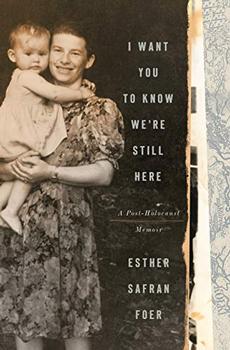Page 5 of 5
There are currently 34 member reviews
for I Want You to Know We're Still Here
-
Sandi W. (East Moline, IL)
'A Post Holocaust Memoir'
It has been a while since I have read a book on the Holocaust. Although I am not of Jewish faith, each book seems to dredge up feelings and images that are simply overwhelming. Knowing that this was a memoir - dubbed as 'A Post Holocaust Memoir' - I went into it very slowly, while also reading a couple other books, to even out the drama and sadness of this one.
I found that I both liked and disliked this book. There were plenty of sections that delved into the lives of Foer's family - I especially liked the parts referring to her Grandmother. But there were also parts that just seemed out of place - such as her repeated mentioning of her sons achievements.
I understand that having to ferret out your past history and family would take a lot of resilience and research. And I admire Foer for what she undertook, especially under the auspice of the Holocaust. However, I believe this book may have been better had her son written it instead.
-
MaryJane B. (Lynch Station, VA)
I Want You To Know We're Still Here
This post-Holocaust memoir has both facts about holocaust survivors as well as personal family history. Esther Safran Foer has taken on the burden of becoming the memory keeper of all of her ancestors who were lost in the holocaust. She's passed this obsession of hers to her children. These traumatic memories are passed on from generation to generation. Much of the book is the result of the intense research she has done to find her family's roots especially her father's story. She traces the difficult journey of her parents' escape from the Nazis in Poland, to a DP camp, to their arrival in America.
Although I found the topic interesting, I felt there was too much detail that applied only to the author's family. I kept wondering who the audience was for this book. Was it survivors of the holocaust or the Safran family searching for their roots?
-
Ilene M. (Longmont, CO)
Not Great
I read many, many books about the Holocaust, both non-fiction and historical fiction. The accounts are always disturbing. Some authors present the information in beautiful and compelling prose. In my opinion, this author did not do a great job. I understand her need to search for the truth about her family, but I do not feel that her writing did a great job in capturing her feelings. Some of the things that she wrote felt out of context. I also felt that she leaned to heavily on the writings of her son, Jonathan Safran Foer. I would not recommend this book.
-
Chris H. (Wauwatosa, WI)
Hard to rate
This book relates a very important part of history and a personal one at that. I have trouble rating it for that reason. The story is important, therefore my rating of 3-average. However, I found the readability challenging, therefore my rating of 2-poor. The challenge of reading this book is that the author talks about too many people and their relationship to one another hard to keep track of. She often refers to her son Jonathan and his book without any background, assuming all readers know what she is talking about. It was about two-thirds into the book that she talks about what is most interesting and what a reader could understand. I think perhaps the author should have included some visual references, perhaps a family tree of sorts, maybe a rough map of her lost homeland. The story itself is important and compelling. The way it is written is where the difficulty, for me, makes my rating of it hard.
-
Jane H. (Prospect, KY)
I Want You To Know We're Still Here
This book was obviously well researched and produced from a place of deep familial love. I, personally, found it was a little slow in the beginning and dogged by repetition. As I went from mid-book to the end, the momentum picked up and I felt more connected. I was curious about the pictures of the family from the DP camps. It appeared the people in the pictures were well dressed and had baby carriages. This seemed contrary to the descriptions of food and basic needs deprivation. Could the pictures be from another time? The ending was beautifully written and provided perfect closure for what I am sure was a most emotional journey for the writer. Kudos to her for her tenacity in chronicling her family history.
[Editor's note: The author addresses the disconnect in this picture on the previous page (p. 57): “...you see what you want to see, or maybe what you need to see, in a photograph… and there are my parents, fashionably dressed…seated at an outdoor picnic…Look closer. In the background there are watchtowers, run-down barracks, and a barbed-wire fence."]
-
Carol F. (Lake Linden, MI)
Not as expected
I wanted to like this book so much. The title was so intriguing and the photo on the cover made me want to start reading immediately. But that is where the attraction ended. Many times throughout the book it seemed more like a plug for her two sons books than the story of holocaust survivors. The story seemed to jump all over the place and felt disjointed and repetitive. I do credit the enormous amount of research and history behind it but wish it were better written.
